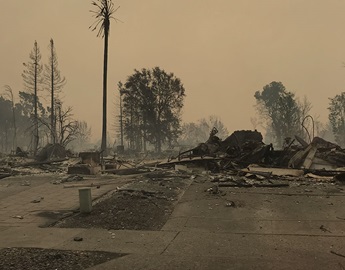Sound barrier
Joshua Young
Church planter and the lead pastor of Redeeming Hope Church
Point Magazine // May 2019
What if I told you an entire culture is around you that is an unreached people group in America? What if I told you a disenfranchised people is in your city that few pastors have considered to love, care for or serve and who are consistently pushed to the margins of society?
This under-reached people group is the Deaf community.
Around 6.5 million deaf or hard of hearing individuals live in the United States. Eight and a half percent are unemployed. Sixty-one percent of deaf people of working age (21-64) do not have full-time employment. Estimates of evangelical deaf in America are as low as 2% or as high as 4%. Statistically, the Deaf community is one of the least reached of any subculture in America today.
Although there are more than 400 sign languages, not one has a complete translation of the Bible. (An ASL translation is expected to be completed next year.) The deaf comprise a statistically significant percent of completely unreached and unengaged people groups across the globe, but there are precious few deaf missionaries.
Serving the marginalized among us
Pastor Kevin McGhee came face to face with the needs of the Deaf in his community, and God transformed his life and ministry. He planted Bethany Community Church in Laurel, Maryland, in 1986. Just two years after the church’s launch, a deaf woman and her fiancé began to attend, with a mutual friend signing for them. But the interpreter was inexperienced, and it soon became clear a change would be necessary for this couple to stay.
They met with McGhee, who had no prior experience with the Deaf, and taught him what it would require for Deaf people to have full access to the gospel. McGhee’s heart was stirred, and he committed to make the changes his new friends sought.
One of the first changes at Bethany was to place a qualified, professional interpreter next to McGhee while he preached.
“The interpreter was not there for the Deaf,” he said. “She was there for me. I was trying to communicate to an audience, and I didn’t speak their language. The only way for me to communicate was to have someone translate for me.”
Over the years, hundreds of Deaf people began meeting, knowing and following Jesus at Bethany. Today, Deaf members make up one-fifth of the congregation. The church also has an extensive ministry to the Deaf in Tanzania.
In 2017, McGhee joined Converge International Ministries as director of U.S. Engagement. One aspect of his role is to help focus our network on this vital under-reached people group in the U.S. and abroad. It is an enormous task in the U.S., but even greater internationally.
The deaf are considered the least reached of the unreached people groups across the world. Almost none of the international Deaf people groups even have trained missionaries or church planters going to them.
The misuse of “diversity”
McGhee’s story demonstrates the need to value diversity uniquely rooted in the story of God and his message of hope. However, the term “diversity” has been diluted by our prevailing church culture until it applies only to race.
Often the impetus of many predominantly monocultural churches is not to have multicultural ministry, but to simply equate multiracial ministry with diversity. Labeling a multiracial ministry as diverse forces all other individuals into one culture. This is not true diversity.
But God has given us a better way, a gospel-centric way that has Christ’s cross at the center of our diversity. Here we can affirm and celebrate our differences as facets of God’s glorious, multigenerational, multicultural and multienabled church.
Before becoming Converge vice president of Biblical Diversity, for 11 years Dr. Harold Lewis pastored a church across the street from Washington, D.C.’s Gallaudet University, the world’s only university designed to be barrier-free for deaf and hard of hearing students.
The biggest barrier between Deaf and hearing people is not language, but trust.
Kevin McGhee
“One Sunday I took my congregation for worship at a Deaf church,” Lewis recounted. “All the music, all the preaching, everything was in sign language. We needed an interpreter. I wanted to introduce my church to a different ability to worship God and a different culture. My congregation needed to learn from them.”
The posture of Lewis and his church was to reject seeing deafness as a defining facet of a group of people, and to embrace their culture as possessing an ability to worship Jesus uniquely. Over many years, the church sought to learn the depths of Deaf culture, and in doing so, they discovered how to uniquely worship Jesus together.
“The cultural differences are simply the tip of the iceberg,” Lewis said. “Beneath the surface are legacies, heritage, idiosyncrasies and a wide variety of characteristics that make the culture what it is.”
McGhee adds, “The biggest barrier between Deaf and hearing people is not language, but trust.”
But the Deaf are only one of thousands of unique cultures God is calling us to love — cultures to celebrate, not ignore.
“We are not called to give away our differences for homogeneity, but to give away the divide that comes from our differences,” Lewis said.
Each One Reach One
Lewis and McGhee did not enter Deaf culture to teach. They entered it to learn, which is vital to reaching any marginalized and disenfranchised culture with the gospel. This humility and deference, in which Christ-followers become students who seek the low place, is key to reaching the unreached with the reachable message of the most accessible Savior. It begins with one-on-one relationships.
McGhee says the real heroes of his story are the Deaf people who endured years of well-intentioned but misguided hearing people’s audism (a term that describes hearing people’s prejudice toward their Deaf neighbors) in order to now share rich friendship with one another.
Cross-cultural relationships such as these are helping tear down the walls and courageously expand gospel living by extending hands of understanding, honor, friendship and partnership across divides.
Converge is asking God for a gospel movement among every least-reached people group in our generation. One such least-reached population lives right where you are. How will you reach them with the life-changing gospel of Jesus Christ?
Joshua Young, Church planter and the lead pastor of Redeeming Hope Church
Joshua Young is a church planter and the lead pastor of Redeeming Hope Church, Clarksville, Tennessee.
Additional articles by Joshua Young


